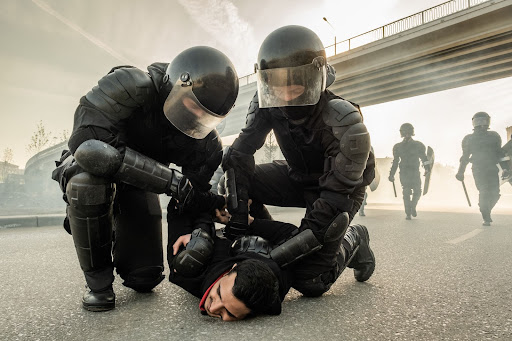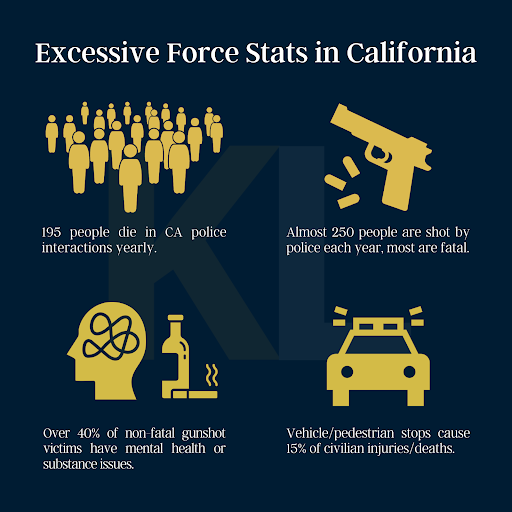In a chilling encounter during a routine traffic stop in California, the actions of a police officer left a 17-year-old girl writhing in “excruciating pain,” her pleas for relief falling on deaf ears. On that fateful day, while driving with friends on March 8, 2023, she and her companions were pulled over by officers from the Chico Police Department. What unfolded next was a nightmarish sequence of events: an officer’s commanding shout, a forceful grip on her arms, a painful twist, and a kick that sent her sprawling to the ground. Despite her cries of agony, her pleas were met with indifference as officers apparently disregarded her suffering.
This incident serves as a stark reminder of the dire consequences of excessive force within law enforcement. In this blog, we delve deep into the definition and implications of excessive force, shedding light on the critical need for understanding these issues. Moreover, we will explore how the experienced legal team at Kirakosian Law stands ready to assist those who seek justice when confronted with similar situations.
Excessive Force: What You Need to Know
Excessive force in law enforcement boils down to using more force than a reasonable police officer would consider necessary in a given situation. It comes into play during arrests, investigatory stops, and other forms of police action. When an officer crosses this line, they can be held responsible for their actions, and even for not intervening when a fellow officer goes too far. The specifics of each case are usually decided by a jury.

The heart of the matter is that excessive force is a type of police brutality. It means using more force than needed to question or apprehend someone. Police officers are expected to use the least amount of force necessary to handle a situation safely. While the law acknowledges that officers, jail staff, and prison officers may need to use reasonable and necessary force due to the risks of their work and quick decisions they have to make, it still puts limits on excessive force.
However, drawing the line between reasonable and excessive force can be challenging. It depends on the circumstances and is evaluated based on standards set by the courts. Additionally, it’s essential to know that there’s no one-size-fits-all federal definition for excessive force. It’s evaluated based on the specific constitutional rights involved, whether it’s an arrestee, pretrial detainee, or post-conviction prisoner. Understanding what excessive force means is crucial for addressing concerns about police conduct and safeguarding civil rights.
Excessive Force Stats in California
In California, the numbers reveal a concerning trend of excessive force in police encounters. Over six years, officers have been involved in almost 1,000 fatal incidents. But the impact of recent efforts to reduce police violence remains uncertain. Legislative changes have aimed to improve officer engagement rules, de-escalation training, and external investigations in cases where unarmed civilians are killed.
Every year, around 195 people lose their lives in interactions with California law enforcement. Gunshots cause most of these deaths, with nearly 250 people shot by police annually. Vehicle and pedestrian stops account for about 15 percent of incidents where civilians are seriously injured or killed. Shockingly, more than 40 percent of those treated for non-fatal gunshot wounds have mental health conditions, alcohol- or substance-related disorders, or both.

These stats underline the importance of knowing your rights, especially when dealing with excessive force. If you become a victim, a personal injury lawyer can be your advocate in seeking justice and holding those responsible accountable. The fight against excessive force continues, and a personal injury attorney can be your guide in California.
Understanding Excessive Force: Your Rights and Legal Remedies
Excessive force, a breach of your constitutional rights, can be addressed through legal actions. You have the option to file a civil rights complaint under Section 1983 of the United States Code, seeking monetary or injunctive relief. Alternatively, you can file a complaint with the U.S. Department of Justice, which might investigate your case.
When determining if a government official, like a police officer, used excessive force, courts examine the overall circumstances to gauge if their actions were “objectively reasonable.” This means considering factors such as the seriousness of the situation, the presence of an immediate threat to the officer or others, whether the person was resisting arrest, alternative options available, and whether warnings were given.
The right to use force is allowed for arrests and investigatory stops but should match the threat. Ideally, officers should employ a graduated approach, starting with their presence and verbal commands, then using physical force if needed, followed by less-lethal methods like batons or Tasers, and, as a last resort, lethal force. Importantly, the use of force must cease when the need for it ends, such as when a suspect is restrained or a situation calms down.
In essence, officers can’t continue using force as a form of punishment once the threat has passed. Your rights matter, and it’s essential to ensure that any use of excessive force is addressed through the appropriate legal channels.
Addressing Excessive Force and Police Misconduct: Your Pursuit of Justice
In our ever-evolving society, the concern over excessive force and police misconduct has become increasingly pronounced. At Kirakosian Law, we are committed to actively pursuing cases that involve improper conduct, false arrests, unjustified shootings, and any form of abuse of power.
Our mission is clear: if a just resolution cannot be reached through mediation or negotiation, we are fully prepared to champion your cause in civil court. We firmly believe in the significance of holding accountable those who violate your civil rights.
Our areas of expertise encompass a range of civil rights cases, including police misconduct, malicious prosecution, and wrongful arrests. If you, or someone you know, has endured emotional distress or suffered injury due to a civil rights violation, please don’t hesitate to reach out to our dedicated team at Kirakosian Law APC. Your initial consultation is not only free but also a crucial step towards understanding your rights and exploring the path to justice.
In this era of growing concern over excessive force and police misconduct, we stand with you, committed to safeguarding your rights, and determined to bring about accountability and justice. Your voice matters, and your pursuit of justice is our shared cause.
